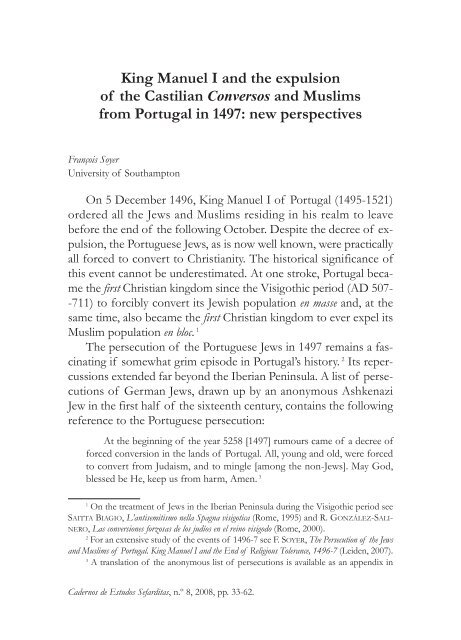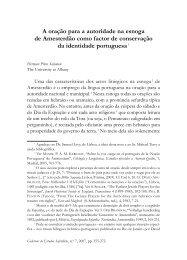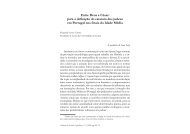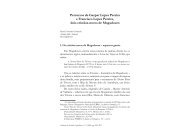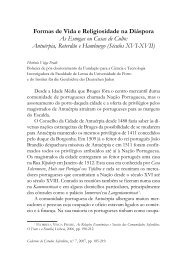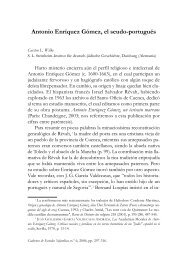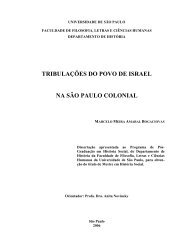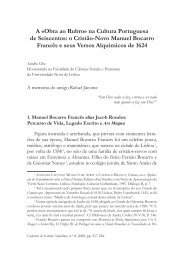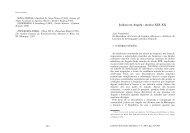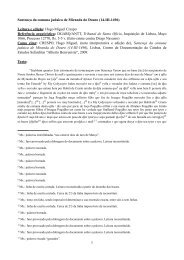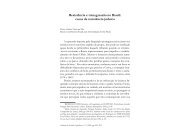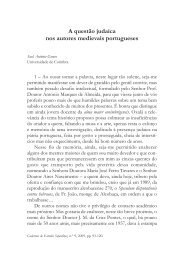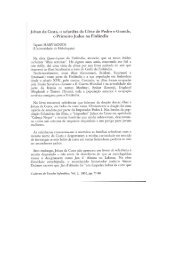Pagina 1-28.qxd - Cátedra de Estudos Sefarditas "Alberto Benveniste"
Pagina 1-28.qxd - Cátedra de Estudos Sefarditas "Alberto Benveniste"
Pagina 1-28.qxd - Cátedra de Estudos Sefarditas "Alberto Benveniste"
Create successful ePaper yourself
Turn your PDF publications into a flip-book with our unique Google optimized e-Paper software.
Pag 33-62:<strong>Pagina</strong> 1-<strong>28.qxd</strong> 10-12-2009 01:13 Page 33<br />
King Manuel I and the expulsion<br />
of the Castilian Conversos and Muslims<br />
from Portugal in 1497: new perspectives<br />
François Soyer<br />
University of Southampton<br />
On 5 December 1496, King Manuel I of Portugal (1495-1521)<br />
or<strong>de</strong>red all the Jews and Muslims residing in his realm to leave<br />
before the end of the following October. Despite the <strong>de</strong>cree of ex -<br />
pulsion, the Portuguese Jews, as is now well known, were practically<br />
all forced to convert to Christianity. the historical significance of<br />
this event cannot be un<strong>de</strong>restimated. at one stroke, Portugal be ca -<br />
me the first Christian kingdom since the Visigothic period (aD 507-<br />
-711) to forcibly convert its Jewish population en masse and, at the<br />
same time, also became the first Christian kingdom to ever expel its<br />
Muslim population en bloc. 1<br />
the persecution of the Portuguese Jews in 1497 remains a fascinating<br />
if somewhat grim episo<strong>de</strong> in Portugal’s history. 2 Its repercussions<br />
exten<strong>de</strong>d far beyond the Iberian Peninsula. a list of persecutions<br />
of german Jews, drawn up by an anonymous ashkenazi<br />
Jew in the first half of the sixteenth century, contains the following<br />
reference to the Portuguese persecution:<br />
at the beginning of the year 5258 [1497] rumours came of a <strong>de</strong>cree of<br />
forced conversion in the lands of Portugal. all, young and old, were forced<br />
to convert from Judaism, and to mingle [among the non-Jews]. May god,<br />
blessed be He, keep us from harm, amen. 3<br />
1 On the treatment of Jews in the Iberian Peninsula during the Visigothic period see<br />
SaItta BIagIO, L’antisemitismo nella Spagna visigotica (Rome, 1995) and R. gOnzález-SalIneRO,<br />
Las conversiones forzosas <strong>de</strong> los judíos en el reino visigodo (Rome, 2000).<br />
2 For an extensive study of the events of 1496-7 see F. SOyeR, The Persecution of the Jews<br />
and Muslims of Portugal. King Manuel I and the End of Religious Tolerance, 1496-7 (lei<strong>de</strong>n, 2007).<br />
3 a translation of the anonymous list of persecutions is available as an appendix in<br />
Ca<strong>de</strong>rnos <strong>de</strong> <strong>Estudos</strong> <strong>Sefarditas</strong>, n.º 8, 2008, pp. 33-62.
Pag 33-62:<strong>Pagina</strong> 1-<strong>28.qxd</strong> 10-12-2009 01:13 Page 34<br />
FRançOIS SOyeR<br />
the infamous “conversão geral” that befell Portuguese Jews in<br />
1497 is perhaps the most evocative illustration of the vulnerability<br />
and ambiguous position of Jews living in Christian societies during<br />
the medieval and early mo<strong>de</strong>rn periods. entirely <strong>de</strong>pen<strong>de</strong>nt upon<br />
the King for protection – literally ‘his Jews’ – their property and<br />
persons were consi<strong>de</strong>red by Manuel to be his to dispose of as he<br />
wished.<br />
In comparison with the expulsion of the Jews from Spain in<br />
1492, the Portuguese persecutions of 1496-7 have generated very<br />
little aca<strong>de</strong>mic <strong>de</strong>bate. In his seminal study entitled História da origem<br />
e estabelecimento da inquisição em Portugal, alexandre Herculano, for instance,<br />
briefly examined these events. It was clear for Herculano that<br />
King Manuel, paying no heed to the misgivings of many of his<br />
councillors, had yiel<strong>de</strong>d to imperious Spanish <strong>de</strong>mands to expel the<br />
Jews and Muslims because of his own selfish <strong>de</strong>sire to further his<br />
ambition to unite the Iberian Peninsula as a result of his marriage<br />
to the Spanish Infanta Doña Isabel:<br />
A princesa D. Isabel era filha mais velha dos Reis Católicos e sua her<strong>de</strong>ira presuntiva,<br />
no caso <strong>de</strong> faltar o príncipe D. João, único fiador da sucessão masculina ao trono <strong>de</strong><br />
Castela. Casando com ela, o rei <strong>de</strong> Portugal via em perspectiva, ao menos como possível, a<br />
reunião das duas coroas da Península numa só cabeça. 4<br />
this straightforward view of the events of 1496-7, in which<br />
King Manuel en<strong>de</strong>d religious tolerance in Portugal in or<strong>de</strong>r to<br />
secure his marriage to the el<strong>de</strong>st daughter of Queen Isabel of<br />
Castile (1474-1504) and King Fernando of aragón (1479-1516) –<br />
who adopted the title, granted to them by the Pope, of Reyes Católicos<br />
from 1496 onwards – has become the uncontested master narrative<br />
concerning the end of religious tolerance in Portugal. It has<br />
A Hebrew Chronicle from Prague, c. 1615, ed. a. David and tr. l. J. Weinberger and D. Ordan<br />
(tuscaloosa, 1993), 79-85 [text quoted from page 83].<br />
4 a. HeRCUlanO, História da origem e estabelecimento da inquisição em Portugal (lisbon,<br />
1975), Vol. 1, 114.<br />
34
Pag 33-62:<strong>Pagina</strong> 1-<strong>28.qxd</strong> 10-12-2009 01:13 Page 35<br />
KIng ManUel I anD tHe exPUlSIOn OF tHe CaStIlIan ConvERSoS anD MUSlIMS...<br />
been accepted by historians without challenge from the nineteenth<br />
century to this very day. In spite of this apparent consensus, a new<br />
examination of this subject is essential.<br />
this paper will not focus on the forced conversion of the Portuguese<br />
Jews but rather on the fate of the Muslim minority and<br />
Castilian conversos who also resi<strong>de</strong>d in Portugal in 1496. that fateful<br />
year actually witnessed three expulsions in Portugal: almost a month<br />
prior to the expulsion edict against the Jews and Muslim in December<br />
1496, an expulsion edict was in<strong>de</strong>ed directed against the Castilian<br />
conversos in november of that same year. there are many subjects<br />
that I would like to discuss here in this paper but, due to the<br />
restrictions imposed by time, I have <strong>de</strong>ci<strong>de</strong>d to talk about two different<br />
aspects of the events of 1496-7 that I believe have been<br />
more or less completely ignored by historians and which urgently<br />
need to be consi<strong>de</strong>red:<br />
• Firstly, I will examine the problem of the Castilian conversos<br />
who arrived in Portugal during the reign of Manuel’s pre<strong>de</strong>cessor<br />
João II (1481-1495), fleeing from the Inquisition in<br />
Spain. I will argue that much of the historiography concerning<br />
the role of the Infanta Isabel in the persecutions of 1496-7<br />
has in fact been misun<strong>de</strong>rstood due to a striking confusion<br />
between the Castilian conversos and Jews.<br />
• Secondly, I shall posit that the expulsion of the Muslim minority,<br />
which has been completely overlooked by the traditional historiography<br />
in Portugal, must be analysed separately. all the<br />
available evi<strong>de</strong>nce points to the fact that the Muslims minority<br />
was expelled for reasons that were very different from those<br />
that led King Manuel to <strong>de</strong>cree the “expulsion” of the Jews.<br />
Manuel I and the Castilian conversos:<br />
Castilian conversos, the <strong>de</strong>scendants of Jewish converts to Christianity,<br />
first started to arrive in Portugal in significant numbers fol-<br />
35
Pag 33-62:<strong>Pagina</strong> 1-<strong>28.qxd</strong> 10-12-2009 01:13 Page 36<br />
FRançOIS SOyeR<br />
lowing the establishment of the Spanish Inquisition during the<br />
1480s. the acute social tensions that resulted from their arrival in<br />
Portugal – particularly in Porto and lisbon – prompted João II to<br />
issue two <strong>de</strong>crees in 1488 and 1493 that forba<strong>de</strong> their immigration<br />
into the kingdom and which expelled those already there. 5 according<br />
to the Portuguese chronicler Rui <strong>de</strong> Pina, the King created a<br />
special Inquisition that initiated a severe crackdown on the suspected<br />
judaizers, although we know next to nothing about this<br />
short-lived Inquisition. 6 a german traveller visiting lisbon, Jerome<br />
Münzer, records in his diary that the conversos had been or<strong>de</strong>red to<br />
leave Portugal by December 1494 and that, at the time he was visiting<br />
lisbon, he witnessed some of them boarding a ship in or<strong>de</strong>r to<br />
go to the Kingdom of naples. 7<br />
Despite the silence of the Portuguese narrative and documentary<br />
sources, an undated Castilian document makes it clear that<br />
large numbers of Castilian conversos still remained in Portugal after<br />
the accession of Manuel I in October 1495. this fascinating document<br />
takes the form of a proposal – or memorial – sent by a certain<br />
“chaplain Pineda” to Isabel and Fernando:<br />
Because of the Inquisition, some persons have fled these kingdoms [of<br />
Castile and aragón] and settled in Portugal. these persons have received<br />
support for their cause in Rome and claim to have received absolution from<br />
the Holy Father. they <strong>de</strong>sire to return to these realms and claim that they<br />
would do so if your Highnesses [Isabel and Fernando] were to be disposed<br />
5 See the articles of H. B. MORenO, “Movimentos Sociais antijudios em Portugal no<br />
século xV” and “Reflexos na cida<strong>de</strong> do Porto da entrada dos conversos em Portugal nos<br />
fins do século xV”, Marginalida<strong>de</strong> e Conflictos Sociais em Portugal nos séculos XIv e xV (lisbon,<br />
1985), 79-88 and 133-160.<br />
6 F. SOyeR, “Was there an Inquisition in Portugal before 1536?”, IACoBvS. Revista <strong>de</strong><br />
Estudios Jacobeos y Medievales, 177-202.<br />
7 “Rex autem Portugalie, morem gerens Regi Hispanie, precepit, ut ante festum nativitatis Domini<br />
omnes Marrani regnum exeant. Qui conduxerunt navem Regine, pulcerrimam navem, et iam per medium<br />
<strong>de</strong>cembris neapolim ibunt.” H. Münzer, ‘Itinerarium Hispanicum’, ed. l. Pfandl, Revue Hispanique,<br />
48 (1920), 83.<br />
36
Pag 33-62:<strong>Pagina</strong> 1-<strong>28.qxd</strong> 10-12-2009 01:13 Page 37<br />
KIng ManUel I anD tHe exPUlSIOn OF tHe CaStIlIan ConvERSoS anD MUSlIMS...<br />
to allow them to return in spite of the sentences [of heresy pronounced<br />
against them by the Inquisition], so that the reverent inquisitors would<br />
receive them and give them reasonable penances. If your Highnesses were<br />
to grant them a safe-conduct to return to these realms and resi<strong>de</strong> in them,<br />
then in return they would give your Highnesses 7,000 ducats. Furthermore,<br />
those who return shall be the 150 [converso] households that have remained in<br />
Portugal because those who did not have a papal absolution were expelled<br />
from [Portugal] by or<strong>de</strong>r of the King of Portugal, who is now <strong>de</strong>ceased. 8<br />
the Spanish historians antónio <strong>de</strong> la torre and luis Suárez<br />
Fernán<strong>de</strong>z believed the date of this document to be april 1487.<br />
this date, however, seems to be quite incorrect. to start with, the<br />
re ference to the King of Portugal “who is now <strong>de</strong>ceased” would<br />
appear to put the date firmly as either 1496 or 1497. In<strong>de</strong>ed, the re -<br />
fe rence can only be to the recent <strong>de</strong>ath of King João II on 25 October<br />
1495 and it cannot possibly refer to the <strong>de</strong>mise of afonso V<br />
(1438-1481). King afonso V had died on 28 august 1481, when the<br />
Castilian Inquisition had begun to operate in andalucía for only a<br />
few months and before the flight of conversos to Portugal had be -<br />
come an issue. even more conclusive is the closing reference to the<br />
fact that all conversos without a papal absolution had been expelled<br />
“by or<strong>de</strong>r of the King of Portugal”: a clear reference to the pre -<br />
vious expulsion edicts of João II in 1488 and 1493. nevertheless,<br />
this document seemingly confirms beyond any doubt that there<br />
8 “Por razon <strong>de</strong> la inquisiçion salieron algunas personas <strong>de</strong>stos reynos al reyno <strong>de</strong> Portogal, los quales<br />
seguyeron en Roma sus cabsas e dizen que ovieron absoluçion <strong>de</strong>l Sancto Padre. Desean benir a estos<br />
reynos a su naturaleza, y dizen que, sy Sus Altezas son <strong>de</strong>llo servydos, movydos a misericordia, e aunque<br />
tengan las dichas sentençias, los quieran admitir, para que los padres <strong>de</strong> la inquisiçion los reciban e les<br />
<strong>de</strong>n penitençias saludables; e con esto, dandoles Sus Altezas seguro para que libremente puedan venir e<br />
entrar e tratar e estar <strong>de</strong> bybyenda en estos sus reynos, que ellos serbyran a Sus Altezas con syete mill<br />
ducados e çiento e çinquenta casas, que han quedado en Portugal porque tenian esta dicha absoluçion <strong>de</strong>l<br />
Santo Padre, que los que non la tenian todos fueron echados <strong>de</strong>l dicho reyno por mandado <strong>de</strong>l rey <strong>de</strong> Portugal,<br />
que agora murio.” a. De la tORRe and l. SUáRez FeRnánDez, Documentos referentes a las<br />
relaciones con Portugal durante el reino <strong>de</strong> los Reyes Catholicos (Valladolid, 1963), 333-4, doc. 378.<br />
37
Pag 33-62:<strong>Pagina</strong> 1-<strong>28.qxd</strong> 10-12-2009 01:13 Page 38<br />
FRançOIS SOyeR<br />
remained a sizeable group of Castilian conversos still residing in Portugal<br />
in 1496, in<strong>de</strong>ed at least 150 households (casas).<br />
the measures implemented by João II had presumably successfully<br />
managed to expel a large number, possibly even most, of the<br />
Castilian conversos but the King had allowed this substantial minority<br />
to remain because of a papal absolution they had received from<br />
Rome. additionally, the effectiveness of the measures taken by<br />
João II to prevent the arrival of further fugitive conversos into Portugal<br />
is open to question. a document preserved in Seville, for example,<br />
informs us that on 13 november 1493 a conversa named Juana<br />
Diaz, who had fled from the tribunal of the Holy Office in Seville<br />
to seek refuge in the town of Faro in the algarve, took steps to<br />
have her daughter Isabel brought from andalucía to the safety of<br />
Por tugal. It is interesting to note that Juana Diaz un<strong>de</strong>rtook to<br />
bring her daughter to Faro in spite of the royal edict promulgated<br />
by João II in July of that very same year, which expressly forba<strong>de</strong><br />
the entry of more conversos into Portugal. 9<br />
Practically nothing is known about these exiled Castilian conversos<br />
during the first years of Manuel’s reign. the royal biographer<br />
Damião <strong>de</strong> góis, like all other Portuguese narrative sources, does<br />
not mention Castilian conversos at all. a rare indirect mention of<br />
Castilian conversos in Portugal does appear in a pardon granted by<br />
Manuel I to a certain Simão álvares of Monforte in May 1496. this<br />
man had escaped from the prison, where he had been imprisoned<br />
for the particularly grave crime of forging the King’s signature on a<br />
do cument. the document states that Simão álvares received his<br />
royal pardon in recognition of the unspecified assistance which he<br />
had provi<strong>de</strong>d in the apprehension, in Évora, of Jacob, his wife<br />
Jamila and their daughter Cimfa by the Crown’s officials Fernão<br />
lopes <strong>de</strong> Carvalho and Rui Dias – respectively juiz and alcai<strong>de</strong> pe -<br />
queno of Évora – in February 1496. according to the pardon, these<br />
9 J. gIl, Los conversos y la Inquisición Sevillana (Seville, 2000), Vol. 1, 105.<br />
38
Pag 33-62:<strong>Pagina</strong> 1-<strong>28.qxd</strong> 10-12-2009 01:13 Page 39<br />
KIng ManUel I anD tHe exPUlSIOn OF tHe CaStIlIan ConvERSoS anD MUSlIMS...<br />
Jews had become Christians in Castile “but became Jews once more<br />
[in Portugal]”. 10 taking this document into account, it would appear<br />
sensible to contend that, even though the presence of those conversos<br />
holding a papal absolution continued to be officially tolerated by<br />
the Portuguese Crown, the illegal arrival of other conversos was not.<br />
this situation was nonetheless not <strong>de</strong>stined to last. the minutes<br />
of the municipal council (actas da vereação) of the town of loulé in<br />
the algarve record that Manuel <strong>de</strong>ci<strong>de</strong>d to proceed against the Cas -<br />
tilian conversos as early as november 1496. according to the transcript<br />
of these very interesting minutes, a royal edict was issued on<br />
14 november by which Manuel I or<strong>de</strong>red all the Castilian conversos<br />
residing in Portugal to leave before the end of august 1497. those<br />
conversos found to be still residing in Portugal after august would<br />
have all their property confiscated and would be punished as the<br />
King saw fit. this document is of paramount importance. to date,<br />
no other version of this particular expulsion edict against the Cas -<br />
tilian conversos has been discovered and the narrative sources (whe -<br />
ther Portuguese or Spanish) entirely fail to mention it. Historians<br />
both insi<strong>de</strong> and outsi<strong>de</strong> of Portugal have been oblivious of its existence<br />
<strong>de</strong>cree and have consequently totally ignored this expulsion<br />
and its important ramifications. 11<br />
there can in<strong>de</strong>ed be little doubt that the expulsion of the<br />
Castilian conversos from Portugal was the result of Spanish pressure.<br />
Portugal remained outsi<strong>de</strong> the jurisdiction of the Spanish Inquisi-<br />
10 “...que em Castela sendo ju<strong>de</strong>us se tornaram cristãos e neste reino se tornaram ju<strong>de</strong>us outra vez.”<br />
Arquivo nacional da Torre do Tombo (a.n.t.t.), Chancelaria <strong>de</strong> Manuel I, bk. 43, fol. 77.<br />
11 the expulsion edict against the Castilian conversos was issued in the town of Santarém<br />
on 14 november 1496 and was apparently received in loulé on 12 January 1497.<br />
“…fazemos saber que consi<strong>de</strong>rando nos como nestes regnos a estada dos conversos que sentenciados sam<br />
pellos comisarios do Santo Padre nom he seruiço <strong>de</strong> nosso Senhor e isso mesmo nom he bem <strong>de</strong> nossos<br />
regnos e asy per outros justas caussas que nos mouem mandamos que ata fim do mes d’Agosto do ano que<br />
vem <strong>de</strong> mill IIIIc LRvII se saiam todos os dictos sentenciados <strong>de</strong> nossos regnos e senhorios (...)”.<br />
l. MIgUel DUaRte, ‘actas <strong>de</strong> Vereação <strong>de</strong> loulé, Século xV’, Revista al-ulya n° 10 (loulé,<br />
2004), 227-9.<br />
39
Pag 33-62:<strong>Pagina</strong> 1-<strong>28.qxd</strong> 10-12-2009 01:13 Page 40<br />
FRançOIS SOyeR<br />
tion and hence continued to represent a safe haven for converso fugitives<br />
even though, as we have seen above, the scarce documentary<br />
evi<strong>de</strong>nce indicates that the Portuguese authorities did arrest some<br />
conversos who illegally moved to the kingdom. Clearly, Isabel and<br />
Fernando could not continue to tolerate this situation.<br />
the presence of the Castilian conversos in Portugal emerged once<br />
more when discussions between Manuel and the Catholic Monarchs<br />
over his marriage to the Infanta Isabel began in earnest in<br />
1496. no evi<strong>de</strong>nce exists concerning the precise nature of the ins -<br />
tructions that the Portuguese King gave his representative but a<br />
marriage contract was finally drawn up on 30 november 1496 at<br />
Burgos in Castile. We are fortunate in that two i<strong>de</strong>ntical versions of<br />
the original marriage contract have been preserved in the vaults of<br />
the Torre do Tombo in lisbon and the Archivo General in Simancas. 12<br />
Contrary to the claims ma<strong>de</strong> by a number of historians, none of the<br />
twelve clauses of the marriage contract actually mention the expulsion<br />
of either the Jews or the “heretics” (i.e. conversos) as a precondition<br />
of the marriage. 13 It seems that Fernando and Isabel, as they<br />
were later to claim – and as we will see further below – received a<br />
separate promise from Manuel to expel the conversos and Jews. this<br />
promise was either an oral one ma<strong>de</strong> by his plenipotentiaries at<br />
Burgos or was ma<strong>de</strong> in a separate document that has either not yet<br />
been found by historians or which has perhaps not withstood the<br />
test of time. the surviving narrative evi<strong>de</strong>nce provi<strong>de</strong>s little helpful<br />
information. the Spanish chroniclers Bernál<strong>de</strong>z and Santa Cruz,<br />
for instance, do not connect the marriage negotiations and the <strong>de</strong>ci-<br />
12 For the document conserved in lisbon see a.n.t.t., Gaveta 17, maço 5, doc. 15. For<br />
the document preserved in Spain see a. De la tORRe and l. SUáRez FeRnánDez, Documentos<br />
referentes a las relaciones con Portugal durante el reino <strong>de</strong> los Reyes Catholicos, 3, 1–8, doc. 467.<br />
13 For the frequently repeated erroneous statement that the marriage contract of 30<br />
no vember 1496 contained a clause promising the expulsion of all Jews from Portugal see,<br />
for instance, a. lOSa, “le statut légal <strong>de</strong>s maures et <strong>de</strong>s juifs portugais pendant les xIIe-<br />
-xVe siècles”, Medievalia. Textos e <strong>Estudos</strong>, 5-6 (1994), 307; F. PORtUgal, ‘O problema<br />
judaico no reinado <strong>de</strong> D. Manuel’, offprint of Armas e Troféus, 3, (1975), 7.<br />
40
Pag 33-62:<strong>Pagina</strong> 1-<strong>28.qxd</strong> 10-12-2009 01:13 Page 41<br />
KIng ManUel I anD tHe exPUlSIOn OF tHe CaStIlIan ConvERSoS anD MUSlIMS...<br />
sion to expel the Jews from Portugal, which they barely mention at<br />
all. 14 the information provi<strong>de</strong>d by the Portuguese chroniclers<br />
Damião <strong>de</strong> góis and Jerónimo Osório is also extremely disappointing.<br />
Damião <strong>de</strong> góis, who was also the keeper of the Royal ar -<br />
chives in lisbon between 1548 and 1571, states that Fernando and<br />
Isabel sent “missives” (cartas) to Manuel in which they re quested<br />
that the King of Portugal expel the Jews. Damião <strong>de</strong> góis does not,<br />
however, provi<strong>de</strong> any indication of when the Portuguese monarch<br />
received these letters. In Damião <strong>de</strong> góis’s chronicle, the <strong>de</strong>cision<br />
to expel the Jews is discussed in chapter 18 whilst the marriage<br />
negotiations are treated separately (and subsequently) in chapter 19<br />
and no explicit connection is ma<strong>de</strong> between these two events. 15<br />
Mutual mistrust between the Castilian and Portuguese courts<br />
was such, however, that the expulsion edict of 14 november 1496<br />
did not mark the end of the “converso problem”. the issue of the<br />
presence of Spanish conversos in Portugal was one of major significance<br />
for the rulers of Castile and aragón. the aragonese chronicler<br />
zurita alleges that Isabel and Fernando simply did not believe<br />
that Manuel actually inten<strong>de</strong>d to honour his promises and implement<br />
the expulsion of the conversos. they suspected some dissemblance<br />
on his part:<br />
It was feared and believed that the King of Portugal did not wish to<br />
expel those people from his realm because, instead of expelling them, he<br />
kept extending the period of time they were allowed to remain [in Portugal],<br />
so that they might remain in Portugal and [they feared that Manuel] was<br />
attempting to secure bulls from the Holy See [of Rome] in his favour. 16<br />
14 anDRÉS BeRnálDez, Memorias <strong>de</strong>l reinado <strong>de</strong> los Reyes Católicos, ed. M. góMez-MORenO<br />
and JUan De M. CaRRIazO (Madrid, 1962), chapter 206, 503; alOnSO De Santa CRUz, Crónica<br />
<strong>de</strong> los Reyes Católicos, ed. J. <strong>de</strong> Mata Carriazo (Seville, 1951), Vol. 2, chapter 18, 85.<br />
15 “Depois que hos Reis <strong>de</strong> Castella lançaram os Iu<strong>de</strong>us fora <strong>de</strong> seus Regnos, & senhorios, quomo<br />
atras fico dito, elrei dom Emanuel requerido per cartas dos mesmos Reis <strong>de</strong>terminou fazer o mesmo...”,<br />
DaMIãO De góIS, Crónica do Felicíssimo Rei D. Manuel (Coimbra, 1949), Vol. 1, chapter 18,<br />
38; JeRónIMO OSóRIO, De Rebus Emmanuelis Regis (lisbon, 1571), 18.<br />
16 “Tambien se sopechava, y aun creya, q ~ el Rey <strong>de</strong> Portugal no auia gana <strong>de</strong> echar aquella ge ~ te <strong>de</strong><br />
su reyno: porque en lugar <strong>de</strong> lançarlos, les alargaua el plazo, que les auia dado, para que se estuuiessen en<br />
41
Pag 33-62:<strong>Pagina</strong> 1-<strong>28.qxd</strong> 10-12-2009 01:13 Page 42<br />
FRançOIS SOyeR<br />
a new diplomatic crisis concerning the presence of Castilian<br />
conversos in Portugal erupted during the spring of 1497. the documentary<br />
sources are largely silent but a careful examination of the<br />
subsequent events and the surviving chronicles can shed light on<br />
what transpired. at some unknown date in early 1497, the Infanta<br />
Isabel wrote a personal letter to her future husband informing him<br />
of her vehement refusal to enter Portugal, and thus to marry him,<br />
until he would fulfil his promise to expel all the “heretics” (hereges)<br />
from his kingdom. all arrangements for the wedding were suspen<strong>de</strong>d.<br />
the Infanta’s intransigent position aroused Manuel’s fury<br />
and he wrote to his future father and mother-in-law to inform them<br />
of his displeasure. 17<br />
Did the Catholic Monarchs <strong>de</strong>liberately manipulate their daughter?<br />
Isabel and Fernando might well have intentionally goa<strong>de</strong>d their<br />
daughter to send her letter and the Portuguese monarch certainly<br />
feared that his putative in-laws were exploiting the issue of the conversos<br />
as a bargaining lever with which to extort further concessions<br />
from him. Damião <strong>de</strong> góis conveys Portuguese suspicions concerning<br />
Princess Isabel’s <strong>de</strong>mands which surprising candour:<br />
the Infanta, induced it was suspected by her parents, wrote a letter to the<br />
King informing him that she would <strong>de</strong>lay her coming to Portugal until all the<br />
Jews (sic) had been expelled. 18<br />
zurita also communicates the same Portuguese fears:<br />
the King of Portugal started to have certain suspicions concerning the<br />
reasons put forward to explain why the Princess <strong>de</strong>layed her <strong>de</strong>parture [for<br />
Portugal]. He feared that her parents the King and Queen harboured other<br />
Portugal, y procuraua <strong>de</strong> ayer bulas <strong>de</strong> la Se<strong>de</strong> Apostolica en su favuor…”, J. zURIta, Historia <strong>de</strong>l Rey<br />
Don Hernando el Catholico. De las Empresas, y Ligas <strong>de</strong> Italia (zaragoza, 1610), fol. 125.<br />
17 DaMIãO De góIS, Crónica do Felicíssimo Rei D. Manuel (Coimbra, 1949), chapter 25, 50.<br />
18 “…no qual meo tempo induzida ha Rainha Prinçesa, quomo se teue per suspeita, pellos Reis seus<br />
pais, screueo hũa carta a elRei pedindolhe que dilatasse sua vĩda atte ter <strong>de</strong> todo lãçado <strong>de</strong> seus Regnos hos<br />
ju<strong>de</strong>us...” DaMIãO De góIS, Crónica do Felicíssimo Rei D. Manuel (Coimbra, 1949), chapter 25, 50.<br />
42
Pag 33-62:<strong>Pagina</strong> 1-<strong>28.qxd</strong> 10-12-2009 01:13 Page 43<br />
KIng ManUel I anD tHe exPUlSIOn OF tHe CaStIlIan ConvERSoS anD MUSlIMS...<br />
<strong>de</strong>signs. although they assured him that the Princess would be sent [to Portugal]<br />
when he had expelled the heretics from his realms, he did not carry<br />
out [the expulsion], for he was very worried that later on they would make<br />
further <strong>de</strong>lays, and new <strong>de</strong>mands. 19<br />
nonetheless, the aragonese chronicler claims that these fears<br />
were groundless and presents less sinister explanation for the<br />
Infanta’s reluctance to enter Portugal:<br />
She attributed the disaster that was the <strong>de</strong>ath of her first husband<br />
[Prince] afonso to the fact that in Portugal [João II] had shown such favour<br />
to the heretics and apostates who had fled from Castile. this caused her to<br />
have many scruples and she was so frightened of offending god that she<br />
claimed she would rather die [than go to Portugal]. 20<br />
the Infanta Isabel had in<strong>de</strong>ed been married to prince afonso,<br />
son and heir of João II, until his acci<strong>de</strong>ntal <strong>de</strong>ath in 1491.<br />
Whether or not the Princess was the tool of her parents’ diplomacy,<br />
as the Portuguese suspected, or whether her disinclination to<br />
remarry was in fact caused by her own religious scruples is a question<br />
for which we will probably never hold a satisfactory answer.<br />
What more might Isabel and Fernando have wanted from Manuel<br />
and the Portuguese? neither zurita nor Damião <strong>de</strong> góis are parti -<br />
cu larly specific about the Portuguese suspicions but there can be no<br />
19 “Como el Rey <strong>de</strong> Portugal entiendiò, que se ponia tanta dilacion por parte <strong>de</strong> la Princesa, en efetuar<br />
su matrimonio, concibiò algunas sospechas, no le pareciendo, que la razon que la Princesa daua, fuesse<br />
la que le mouia a sobreseer en su ida: y temia que los Reyes sus padres tuuiessen otros fines: y aunque se<br />
asseguraua por su parte, que <strong>de</strong>sterrando los Hereges <strong>de</strong> sus Reynos, a la hora embiaran a su muger a<br />
Portugal, no se <strong>de</strong>terminaua en cumplirlo: y recelaua, que <strong>de</strong>spues no huuiesse otros achaques, y nueuas<br />
<strong>de</strong>mandas.” J. zURIta, Historia <strong>de</strong>l Rey Don Hernando el Catholico. De las Empresas, y Ligas <strong>de</strong><br />
Italia (zaragoza, 1610), fol. 124v.<br />
20 “… y el <strong>de</strong>sastre acaecido en la persona <strong>de</strong>l Principe don Alõso su primer esposo, lo attribuya, al<br />
ayer se tanto favorecido en aquel reynos los hereges, y apostatas, que se aviã huydo <strong>de</strong> Castilla: y formaua<br />
grã escrúpulo <strong>de</strong>llo: y crecia le tanto el temor <strong>de</strong> ofen<strong>de</strong>r a Dios en esto, que afirmaua, que antes recibiria<br />
la muerte.” J. zurita, Historia <strong>de</strong>l Rey Don Hernando el Catholico. De las Empresas, y Ligas <strong>de</strong> Italia<br />
(zaragoza, 1610), fol. 124v.<br />
43
Pag 33-62:<strong>Pagina</strong> 1-<strong>28.qxd</strong> 10-12-2009 01:13 Page 44<br />
FRançOIS SOyeR<br />
doubt that what Manuel was most fearful of was a Spanish attempt<br />
to put pressure on him to join the Holy league against France. It is<br />
difficult to establish exactly when Manuel was first approached by<br />
representatives of Isabel and Fernando with an invitation to join<br />
the Holy league as our two main sources provi<strong>de</strong> contradictory sta -<br />
tements. the Portuguese Damião <strong>de</strong> góis states that Manuel was<br />
invited to join the Holy league whilst he was staying in estremoz,<br />
in early 1497. 21 In contrast to this, the Spaniard zurita places the re -<br />
quest firmly in 1496 and as having been ma<strong>de</strong> at the same time as<br />
the marriage negotiations were taking place. 22 On balance, it<br />
appears far more plausible that the invitation was ma<strong>de</strong> in 1497<br />
rather than in 1496. If Isabel and Fernando had thought that the<br />
Portuguese monarch was in no position to refuse to join the Holy<br />
league, they were to be sorely disappointed as Manuel stood his<br />
ground firmly:<br />
(…) concerning these alliances, the King politely <strong>de</strong>clined [to join],<br />
promising, however, that if the King of France inva<strong>de</strong>d the kingdom of<br />
Castile he would come to its aid <strong>de</strong>spite the peace and friendship he had with<br />
the monarch of France. 23<br />
the discontent that Manuel’s refusal provoked at the Spanish<br />
court is reflected by zurita, who indignantly records that the Portuguese<br />
King had preferred to uphold his “friendship” with the<br />
French King “even though he had entered into the possession of<br />
that realm [of Portugal] by the favour, and with the help, of the<br />
King [of aragón] and the Queen [of Castile].” 24 Manuel’s refusal to<br />
21<br />
DaMIãO De góIS, Crónica do Felicíssimo Rei D. Manuel (Coimbra, 1949), chapter 19, 40.<br />
22 J. zURIta, Historia <strong>de</strong>l Rey Don Hernando el Catholico. De las Empresas, y Ligas <strong>de</strong> Italia<br />
(zaragoza, 1610), fol. 88v.<br />
23 “... das quaes alianças se elrei excusou, prometendo com tudo q ~ se elrei da França lhes viesse fazer<br />
guerra <strong>de</strong> ~ tro dos regnos <strong>de</strong> Castella, que em tal caso ho ajudaria, sem embargo da paz, & amiza<strong>de</strong> que<br />
entam com ho dicto rei <strong>de</strong> França tinha...” Damião <strong>de</strong> góis, Crónica do Felicíssimo Rei D. Manuel<br />
(Coimbra, 1949), Vol. 1, chapter 19, 40.<br />
24 “…aunque avia entrado en la posesión <strong>de</strong> aquel Reyno con el favour, y amparo <strong>de</strong>l Rey, y <strong>de</strong> la<br />
44
Pag 33-62:<strong>Pagina</strong> 1-<strong>28.qxd</strong> 10-12-2009 01:13 Page 45<br />
KIng ManUel I anD tHe exPUlSIOn OF tHe CaStIlIan ConvERSoS anD MUSlIMS...<br />
in tervene in wars between different european powers was to<br />
become a feature policy of his reign. throughout his reign, Manuel<br />
observed a position of strict neutrality in european affairs. Manuel<br />
knew only too well that he had nothing to gain – and much to lose<br />
– by actively participating in european wars. a war with France<br />
would only had diverted precious material and financial resources<br />
away from his projects to expand Portuguese rule in north africa<br />
and open a sea route to India. the King of Portugal had no territorial<br />
claims to <strong>de</strong>fend against France either in Italy or in<strong>de</strong>ed any<br />
other part of europe beyond the Pyrenees. Furthermore, apart from<br />
occasional acts of piracy committed by French ships, relations be -<br />
tween the Crowns of France and Portugal were generally amicable. 25<br />
the outraged reply that Manuel sent to the Spanish court,<br />
immediately after receiving the princess’ <strong>de</strong>mands, is unfortunately<br />
no longer extant. We are nonetheless able to gain an insight into its<br />
content from a surviving letter that Isabel and Fernando wrote to<br />
their ambassador in Portugal, álvaro <strong>de</strong> Silva, on 21 June 1497, in<br />
which they gave him clear instructions relating to what he was to<br />
say on their behalf to the Portuguese King to appease his anger:<br />
as [King Manuel] already knows, at the time when the marriage negotiations<br />
were taking place [in Burgos], the Princess imposed the precondition<br />
that he was to expel all the heretics from his realms and lordships before she<br />
entered them. [the Princess] asked us [to make this condition] when the<br />
engagement was agreed and did not even want to agree to [the engagement]<br />
until [the heretics] had left [Portugal]. nonetheless, we all told her then that<br />
she did not need to worry as the heretics would be expelled before her entry<br />
into Portugal. two or three days after this, when [King Manuel] himself<br />
could not yet have known of the engagement, or the precondition set by the<br />
Reyna.” J. zURIta, Historia <strong>de</strong>l Rey Don Hernando el Catholico. De las Empresas, y Ligas <strong>de</strong> Italia<br />
(zaragoza, 1610), fol. 88v.<br />
25 the Portuguese policy of adopting strict neutrality in european wars that Manuel I<br />
resolutely clung to was later also adopted by his son João III. DaMIãO De góIS, Crónica do<br />
Felicíssimo Rei D. Manuel (Coimbra, 1949), Vol. 3, chapter 23, 100; I. MenDeS DRUMOnD<br />
BRaga, Um espaço, duas monarquias (lisbon, 2001), 143-173.<br />
45
Pag 33-62:<strong>Pagina</strong> 1-<strong>28.qxd</strong> 10-12-2009 01:13 Page 46<br />
FRançOIS SOyeR<br />
Princess, there came the news that he had or<strong>de</strong>red the heretics to leave his<br />
realms. [this took place] in such a way that it seemed to be a miracle from<br />
god. 26<br />
the importance of this letter cannot be overestimated. It has<br />
generally been assumed in various articles and books that the<br />
“heretics” (hereges) to which the Infanta Isabel was referring were in<br />
fact the Jews (ju<strong>de</strong>us/judíos) whom Manuel or<strong>de</strong>red to leave to Portugal<br />
on 5 December 1496, and that she might even have inclu<strong>de</strong>d the<br />
Muslim minority in Portugal as well un<strong>de</strong>r that <strong>de</strong>signation. 27<br />
Such an assertion is nevertheless quite incorrect. the letter that<br />
Queen Isabel of Castile sent to alvaro <strong>de</strong> Silva goes a long way<br />
towards i<strong>de</strong>ntifying who the “heretics” were and makes it apparent<br />
that she cannot be referring to either Jews or Muslims. In the letter,<br />
Isabel and Fernando clearly state that news of the expulsion of the<br />
“heretics” reached them at Burgos, where they were then staying,<br />
26 “Y que ya sabe que, al tiempo que se trataua este casamiento, la princessa pidio por condiçion que<br />
el rey huuiesse <strong>de</strong> echar todos los hereges <strong>de</strong> sus reynos y señorios antes que ella entrasse en ellos, y esto<br />
mismo pidio al tiempo que se fizo el <strong>de</strong>sposorio; y no lo queria hazer hasta que fuessen salidos, sino que<br />
todos <strong>de</strong>ximos que no lo <strong>de</strong>touiesse por aquello, que, antes que ella fuesse a Portugal, serian echados los<br />
dichos hereges; y con esta condiçyon fizo ella el <strong>de</strong>sposorio. Y acahecio que dos o tres dias <strong>de</strong>spues <strong>de</strong> hesso,<br />
a tiempo que no pudia el ahun saber el <strong>de</strong>spossorio ni la condiçion que en el se hauia pedido, vino nueua<br />
como el hauia mandado que saliesen <strong>de</strong> sus reynos todos los dichos hereges; <strong>de</strong> manera que a todos nos parecio<br />
cosa que venia <strong>de</strong> Dios.” a. De la tORRe and l. SUáRez FeRnánDez, Documentos referentes<br />
a las relaciones con Portugal durante el reino <strong>de</strong> los Reyes Catholicos (Valladolid, 1963), Vol. 3, 12-5,<br />
doc. 470.<br />
27 Professor Maria José Ferro tavares, for instance, makes this claim in the following<br />
work: M. J. P. FeRRO taVaReS, “a expulsão dos ju<strong>de</strong>us <strong>de</strong> Portugal: conjuntura peninsular”,<br />
oceanos, 29 (1997), 13: “Po<strong>de</strong>mos concluir pela correspondência citada que os ju<strong>de</strong>us e mouros<br />
foram integrados nas mesmas exigências <strong>de</strong> expulsão dos conversos castelhanos, fugidos à Inquisição espanhola<br />
ou que o termo hereges englobrava este e todo os infiéis.” Her opinion is also expressed in her<br />
english article “expulsion or integration? the Portuguese Jewish Problem”, Crisis and Creativity<br />
in the Sephardic World 1391-1648, ed. B. R. gampel (new york, 1997), 99: “Who were<br />
these heretics? At first glance we might conclu<strong>de</strong> that they were Castilian conversos who had found refuge<br />
in Portugal. However, the majority of these had already left for naples, and those who remained in the<br />
kingdom were consi<strong>de</strong>red good Christians. The princess’s refusal to cross the bor<strong>de</strong>r into Portugal before the<br />
last Jews had left the country clearly indicated that they were inclu<strong>de</strong>d in the <strong>de</strong>signation of heretics.”<br />
46
Pag 33-62:<strong>Pagina</strong> 1-<strong>28.qxd</strong> 10-12-2009 01:13 Page 47<br />
KIng ManUel I anD tHe exPUlSIOn OF tHe CaStIlIan ConvERSoS anD MUSlIMS...<br />
only “two or three days” after the conclusion of the marriage contract<br />
on 30 november 1496. they thus received the news of the ex -<br />
pulsion edict on circa 2 or 3 December 1496. It is thus impossible<br />
that they would be referring to the news of the expulsion of Jews<br />
and Muslims from Portugal, which was only ma<strong>de</strong> public on 5 De -<br />
cember. there can be little doubt that Isabel and Fernando were<br />
referring in their letter to the or<strong>de</strong>r of expulsion directed against<br />
the Castilian conversos in Portugal, whose existence is recor<strong>de</strong>d in the<br />
transcript of the official minutes of the town council of Silves<br />
(which have already been discussed further above). this expulsion<br />
edict directed against the Castilian conversos had been issued by<br />
Manuel I two weeks earlier at Santarém on 14 november 1496 and<br />
it is entirely plausible that, given the distances involved and the<br />
harsh weather of the winter season, news of the anti-converso expulsion<br />
edict only reached Burgos on 2 or 3 December.<br />
the confusion relating to the exact i<strong>de</strong>ntity of the “heretics” is<br />
not simply the fault of mo<strong>de</strong>rn historians but in reality dates back<br />
to the very first Portuguese accounts of these events. In this respect,<br />
there is in<strong>de</strong>ed a major divergence between Spanish and Portuguese<br />
sources. the aragonese chronicler zurita consistently refers to<br />
“heretics” in his work but, in the sixteenth century, the Portuguese<br />
authors Damião <strong>de</strong> góis and the Bishop of Portalegre amador<br />
arrais, for instance, both wrote that the Infanta had called for the<br />
expulsion of the “Jews” (ju<strong>de</strong>us). 28 In this period, the Castilians and<br />
aragonese consistently employed the term “heretic” to <strong>de</strong>scribe conversos<br />
and never applied it to the Jews. It was an extremely common<br />
popular insult in Castile and aragón to <strong>de</strong>scribe a converso as a Jew<br />
but the reverse never took place. no one in either Castile or aragón<br />
would ever have referred to a Jew as a converso! It is in<strong>de</strong>ed clear that<br />
28 “La princesa lo differia pidiendo que auia el Rey don Manuel <strong>de</strong> echar primero <strong>de</strong> su reyno, todos<br />
los que se auian recogido a el, por miedo <strong>de</strong> la inquisition: cõtra quien se auia procedido en ausencia, y<br />
estauã con<strong>de</strong>nados, como conuencidos <strong>de</strong> hereges.” J. zURIta, Historia <strong>de</strong>l Rey Don Hernando el Catholico.<br />
De las Empresas, y Ligas <strong>de</strong> Italia (zaragoza, 1610), fol. 124v.<br />
47
Pag 33-62:<strong>Pagina</strong> 1-<strong>28.qxd</strong> 10-12-2009 01:13 Page 48<br />
FRançOIS SOyeR<br />
Damião <strong>de</strong> góis and amador arrais both ma<strong>de</strong> a glaring confusion<br />
between the Jews and the Castilian conversos. the Portuguese authors<br />
might have been reflecting the ten<strong>de</strong>ncy, wi<strong>de</strong>spread amongst the<br />
Portuguese population in the sixteenth and seventeenth centuries,<br />
to negatively characterise all the <strong>de</strong>scendants of converts from Ju -<br />
daism, or “new Christians”, as “Jews”. the impact of this muddle<br />
on our perception of the events of 1496-7 has exten<strong>de</strong>d to mo<strong>de</strong>rn<br />
scholarship ever since. 29<br />
the intervention of Princess Isabel over the expulsion of the<br />
conversos led to renewed negotiations in 1497 relating to the terms of<br />
the marriage contract. these discussions apparently continued<br />
throughout the month of July and into early august. now, however,<br />
pressure began to mount on the Spanish court for a speedy<br />
conclusion of the marriage. On 29 July, the Spanish ambassador<br />
alfonso da Silva urgently wrote to his masters, warning them that<br />
certain councillors of the Portuguese King, distrustful of Castilian<br />
aims, were sowing seeds of doubt in his mind and advising him<br />
against the marriage. 30 a new agreement was finally drawn up on 11<br />
august 1497 with João Manuel, the High Chamberlain of Portugal,<br />
signing the document in his capacity as King Manuel’s plenipotentiary.<br />
Manuel pledged to expel all the Castilian conversos residing<br />
within Portugal by the end of September 1497. In a separate document,<br />
inclu<strong>de</strong>d within the new marriage contract, the Infanta herself<br />
left no doubt concerning who the “heretics” were. She swore to<br />
stand by the terms of the new agreement so long as Manuel effec-<br />
29 DaMIãO De góIS, Crónica do Felicíssimo Rei D. Manuel (Coimbra, 1949), chapter 25,<br />
50 (quoted above); FReI aMaDOR aRRaIS, Diálogos, ed. M. lopes <strong>de</strong> almeida (Porto, 1974),<br />
112-3.<br />
30 “Los que stan en gana <strong>de</strong> turbar este negoçio o <strong>de</strong> <strong>de</strong>rramalle dizen al rey para ponelle miedo que<br />
como <strong>de</strong>be tirar seguro si vuestras altezas no se quieren contentar <strong>de</strong> querer las vistas otro dia <strong>de</strong>spues <strong>de</strong><br />
haverse el velado, y a el asientasele aquello porque con sus reçelos parecele que se cumple con todas partes<br />
en fazerse assi.” l. SUáRez FeRnánDez, Política Internacional <strong>de</strong> Isabel la católica. Estudio y Documentos<br />
(Valladolid, 1972), Vol. 5, 198-9, doc. 34.<br />
48
Pag 33-62:<strong>Pagina</strong> 1-<strong>28.qxd</strong> 10-12-2009 01:13 Page 49<br />
KIng ManUel I anD tHe exPUlSIOn OF tHe CaStIlIan ConvERSoS anD MUSlIMS...<br />
tively expelled “all those con<strong>de</strong>mned [for heresy] over here [in<br />
Castile], who are presently in his realms and lordships.” 31<br />
Manuel I and the expulsion of the Muslim minority<br />
Having examined the fate of the Castilian conversos, I would now<br />
like to turn to that other forgotten minority in medieval Portugal:<br />
the Muslims. 32 the expulsion of the Muslim minority from Portugal<br />
has always been overshadowed by the brutal forced conversion<br />
of the Jews. Contemporary Portuguese chroniclers barely refer to it<br />
and Jewish sources never mention the fact that the expulsion edict<br />
also affected Muslims. Mo<strong>de</strong>rn studies rarely, if ever, mention it.<br />
this striking silence is to a large extent probably due to the total<br />
absence of any Muslim sources that might shed light on this event<br />
and offer us a Muslim perspective. the lack of information relating<br />
to the expulsion of the Portuguese Muslims is all the more remarkable<br />
as the event itself is so surprising. Manuel’s <strong>de</strong>cision to expel<br />
his Muslim subjects is difficult to un<strong>de</strong>rstand and was a totally<br />
unprece<strong>de</strong>nted act. throughout the Iberian Peninsula, the presence<br />
of Muslim communities continued to be tolerated by the Christian<br />
authorities until 1502 in Castile, 1516 in navarre and 1525-6 in the<br />
territories of the Crown of aragón.<br />
One of the first and most important questions concerning the<br />
expulsion of the Muslims might seem an incongruous one but is<br />
certainly crucial: did it actually take place? In 1904, antónio <strong>de</strong><br />
31 “…todos los que fueron con<strong>de</strong>nados aqua por hereges que stan en los dichos sus reynos e señorios…”.<br />
a.n.t.t., Gaveta 17, maço 1, doc. 9; Gavetas da Torre do Tombo, ed. a. Da SIlVa RegO,<br />
Centro <strong>de</strong> <strong>Estudos</strong> Históricos Ultramarinos (lisbon, 1967), Vol. 6, 486-8, doc. 4080; a. De la<br />
tORRe and l. SUáRez FeRnánDez, Documentos referentes a las relaciones con Portugal durante el<br />
reino <strong>de</strong> los Reyes Catholicos (Valladolid, 1963), Vol. 3, 15-8, doc. 471 [the authors wrongly<br />
give date in the document’s title as 11 July 1497].<br />
32 On the Muslim minority in medieval Portugal see the seminal and masterful study<br />
by MaRIa FIlOMena lOPeS De BaRROS, Tempos e espaços <strong>de</strong> mouros: a minoria muçulmana no<br />
reino português, séculos XII a Xv (lisbon, 2007).<br />
49
Pag 33-62:<strong>Pagina</strong> 1-<strong>28.qxd</strong> 10-12-2009 01:13 Page 50<br />
FRançOIS SOyeR<br />
Sousa Silva Costa lobo, the only historian to have actually examined<br />
the expulsion of the Muslims in any <strong>de</strong>tail, argued that the ex -<br />
pulsion did not in fact occur. according to Costa lobo, Manuel<br />
simply abolished organised Islamic worship in Portugal and merely<br />
satisfied himself with the confiscation of the communal property<br />
of the Muslim communities (mosques, prisons and cemeteries), fi -<br />
nally allowing Muslims to remain in his kingdom. Costa lobo be -<br />
lieved that the expulsion edict was used as an excuse to extort<br />
money from the Muslim minority. His stark conclusion was the following<br />
one:<br />
nenhuma reducção attendivel foi causada na população islamita pela or<strong>de</strong>nação que<br />
se gloriava <strong>de</strong> expurgar o paiz <strong>de</strong> todos os infieis. (...) Essa or<strong>de</strong>nação, em relação aos<br />
mouros, não fez nada mais que extinguir o culto do Koran. 33<br />
In spite of these assertions, there is in fact consi<strong>de</strong>rable documentary<br />
evi<strong>de</strong>nce to prove that the Muslim minority did leave Portugal<br />
in the late winter and spring of 1497. 34<br />
Of the many enigmas surrounding the expulsion of the Portuguese<br />
Muslims, the most persistent and difficult ones to answer<br />
remain the ones asked in a short article on the subject that was<br />
authored by the British historian l. P. Harvey and published in<br />
1995: Why the Muslims? Why Portugal? Why 1497? 35<br />
Manuel did not reveal the reasoning behind his <strong>de</strong>cision in any<br />
surviving document and contemporary source do not provi<strong>de</strong>s any<br />
solution to these seemingly simple questions. the prevalent expla-<br />
33 a. De SOUSa SIlVa COSta lOBO, História da socieda<strong>de</strong> em Portugal no século Xv<br />
(lisbon, 1904), 42-6 (quote page 46).<br />
34 For further information concerning the <strong>de</strong>parture of Muslims from Portugal in<br />
1497 see F. SOyeR, The Persecution of the Jews and Muslims of Portugal. 243-253 and 260-8 and<br />
“el Rey Manuel y la expulsión <strong>de</strong> los Moros <strong>de</strong> Portugal (1496-7)”, Iacobus: Revista <strong>de</strong> Estudios<br />
Jacobeos y Medievales, 21-22 (2006), 363-400.<br />
35 l. P. HaRVey, “When Portugal expelled its remaining Muslims (1497)”, Portuguese<br />
Studies, 2 (1995), 1-14.<br />
50
Pag 33-62:<strong>Pagina</strong> 1-<strong>28.qxd</strong> 10-12-2009 01:13 Page 51<br />
KIng ManUel I anD tHe exPUlSIOn OF tHe CaStIlIan ConvERSoS anD MUSlIMS...<br />
nation, in<strong>de</strong>ed the only one put forward by historians both in and<br />
out of Portugal, is that the Portuguese Muslims like the Jews of<br />
that realm, were the victims of Spanish pressure on Manuel I. Isa -<br />
bel and Fernando are thus supposed to have <strong>de</strong>man<strong>de</strong>d that Manuel<br />
expel the Muslims of his realm as well as the Jews before they<br />
would consent to granting him their daughter. this i<strong>de</strong>a has important<br />
ramifications for historians as it presupposes that Isabel and<br />
Fernando harboured a plan to rid the Iberian Peninsula of Muslims<br />
(or at least of public Islamic worship). Professor Harvey, in particular,<br />
has cited the expulsion of the Portuguese Muslims as evi<strong>de</strong>nce<br />
to support his claim that “it was curiously in Portugal and not in<br />
any of the Spanish realms that Spain was first able to insist on the<br />
implementation of a policy of monolithic Catholic Christian unity,<br />
with, as a corollary, the elimination of all other faiths.” 36<br />
Many mo<strong>de</strong>rn historians have in<strong>de</strong>ed perceived Isabel and Fernando<br />
as having formulated and enforced a coherent policy of religious<br />
uniformity <strong>de</strong>signed to strengthen their political power. In a<br />
few extreme cases, there has even been a confusion of facts which<br />
has led some historians to erroneously state that the Catholic Monarchs<br />
expelled the Muslim minority in their kingdoms at the same<br />
time as the Jews in 1492, which was certainly not the case. 37 the<br />
notion that Isabel and Fernando pursued a Machiavellian and<br />
coherent policy of religious homogenisation from the very beginning<br />
of their reign makes little sense and is not supported by any<br />
narrative or documentary evi<strong>de</strong>nce. to begin with, if the Catholic<br />
Monarchs did in<strong>de</strong>ed formulate a “política <strong>de</strong> exclusion” from the start<br />
36 l. P. HaRVey, Muslims in Spain 1500 to 1614 (Chicago: University of Chicago Press,<br />
2005), 15.<br />
37 For instance in a. lOSa, «le statut légal <strong>de</strong>s maures et <strong>de</strong>s juifs portugais pendant<br />
les xIIe-xVe siècles», Medievalia. Textos e <strong>Estudos</strong>, 5-6 (1994), 307: «Fernando et Isabel, en 1492<br />
avaient expulsé d’Espagne les juifs et les maures qui restaient après la conquête <strong>de</strong> Grenada. or parmi les<br />
clauses du contrat <strong>de</strong> mariage <strong>de</strong> la princesse, était exigé, <strong>de</strong> la part du monarque portugais, l’expulsion <strong>de</strong><br />
tous les maures et juifs vivant dans son Royaume.»<br />
51
Pag 33-62:<strong>Pagina</strong> 1-<strong>28.qxd</strong> 10-12-2009 01:13 Page 52<br />
FRançOIS SOyeR<br />
of their reign then it is difficult to un<strong>de</strong>rstand why they did not also<br />
force the rulers of navarre to expel their Muslim subjects when<br />
they forced them to expel the Jews of navarre in 1498. navarre in<br />
1498 was in an even more <strong>de</strong>licate position than Portugal in 1497.<br />
Successive treaties – notably those of Valencia in 1488, Pamplona<br />
in 1493 and Madrid in 1495 – had to all intents and purposes re -<br />
duced navarre to the status of a Spanish protectorate. the rulers<br />
of navarre were not in a position to turn down such a <strong>de</strong>mand.<br />
their position vis-à-vis the Catholic Monarchs was so weak that the<br />
famous French diplomat Philippe <strong>de</strong> Commynes commented in his<br />
famous memoirs that Isabel and Fernando “did what they wanted<br />
with navarre”. 38 If Isabel and Fernando were in<strong>de</strong>ed planning to<br />
rid their realms of Muslims and did pressure Manuel into expelling<br />
his own Muslim subjects in 1497, why then did they not also follow<br />
exactly the same policy with navarre? When navarre expelled its<br />
Jewish population in 1498, because of pressure from Isabel and Fernando,<br />
it did not also drive out its Muslim inhabitants. even after<br />
Castilian troops inva<strong>de</strong>d navarre in 1512, the local Muslim communities<br />
continued to resi<strong>de</strong> in that kingdom until 1516, when navarre<br />
was formally attached to the Crown of Castile and adopted all of its<br />
laws and edicts, including the Castilian expulsion edict of 1502. 39 It<br />
is also worth mentioning that the expulsion of the Portuguese Muslims,<br />
just like that of the Jews, does not feature in any clause of the<br />
marriage contract between Manuel and Isabel that was drawn up at<br />
Burgos on 30 november 1496. Moreover, it appears even more<br />
improbable that, as has been suggested, the Muslims were inclu<strong>de</strong>d<br />
among the “heretics” that Infanta Isabel wanted Manuel to expel<br />
before she would agree to marry him and enter Portugal. 40<br />
38 J. Del BURgO, Historia general <strong>de</strong> navarra <strong>de</strong>s<strong>de</strong> los orígenes hasta nuestros días (Madrid,<br />
1992), Vol. 2, 231-257; PHIlIPPe De COMMyneS, Mémoires, ed. J. Blanchard (Paris, 2001),<br />
667.<br />
39 l. P. HaRVey, Islamic Spain 1250 to 1500 (Chicago, 1990), 149-150.<br />
40 M. J. P. FeRRO taVaReS, “a expulsão dos ju<strong>de</strong>us <strong>de</strong> Portugal: conjuntura peninsular”,<br />
oceanos, 29 (1997), 13.<br />
52
Pag 33-62:<strong>Pagina</strong> 1-<strong>28.qxd</strong> 10-12-2009 01:13 Page 53<br />
KIng ManUel I anD tHe exPUlSIOn OF tHe CaStIlIan ConvERSoS anD MUSlIMS...<br />
the attitu<strong>de</strong> of Isabel and Fernando towards their own Muslim<br />
subjects up to the time of the Portuguese expulsion betrayed no<br />
pre monitory signs of their future policies. even though the Jews<br />
were expelled from Castile and aragón in 1492, it was a full <strong>de</strong>ca<strong>de</strong><br />
before the Muslims of Castile were likewise forced to either leave<br />
to convert to Christianity. When false rumours circulated in Castile<br />
and aragón in 1493 that they inten<strong>de</strong>d to expel the Muslims as well<br />
as the Jews, Isabel and Fernando reacted vigorously and sent a letter<br />
all the magistrates and justices of their realms in which they categorically<br />
and publicly <strong>de</strong>nied this news. all those who were found<br />
to be circulating such false reports were to be arrested by their officials.<br />
the <strong>de</strong>cision to force the Muslim population living in Castilian<br />
territory to convert in 1502 has its roots firmly in the revolt of the<br />
granadan Muslims in 1499-1500. 41 the <strong>de</strong>cision to expel the Jews<br />
on 31 March 1492 had been prompted by the fear that their presence<br />
encouraged the judaizing of conversos but, until 1500, there was<br />
no similar problem with the Muslim minority in Castile. at the<br />
surren<strong>de</strong>r of granada, in January 1492, the Christian victors had<br />
guaranteed that the religious freedom of the conquered Muslim<br />
population would be respected and this agreement had been<br />
acknow ledged by the first archbishop of post-conquest granada,<br />
Hernando <strong>de</strong> talavera. It was not until the zealous and intolerant<br />
Francisco Jiménez <strong>de</strong> Cisneros – who occupied the influential position<br />
of confessor to Queen Isabel of Castile and became archbishop<br />
of toledo in 1495 – intervened directly in granada that the<br />
situation <strong>de</strong>teriorated. Cisneros forced many granadan Muslims of<br />
Christian origin, the renegados, to accept baptism and his brutal<br />
41 M. a. laDeRO QUeSaDa, “Isabel and the Moors”, Isabel La Católica, Queen of Castile:<br />
Critical Essays, ed. D. Boruchoff (new york, 2003), 177-187; M. MeyeRSOn, The Muslims<br />
of valencia in the Age of Fernando and Isabel: between Coexistence and Crusa<strong>de</strong> (Berkeley, 1991),<br />
51-60 and “Religious change, regionalism, and royal power in the Spain of Fernando and<br />
Isabel”, Iberia and the Mediterranean world of the Middle Ages: studies in honor of Robert I. Burns,<br />
S. J. vol. 1., Proceedings from Kalamazoo, ed. l. J. Simon (lei<strong>de</strong>n, 1995), 96-112.<br />
53
Pag 33-62:<strong>Pagina</strong> 1-<strong>28.qxd</strong> 10-12-2009 01:13 Page 54<br />
FRançOIS SOyeR<br />
methods resulted in a series of bloody Muslim rebellions between<br />
1499 and 1501. It was these uprisings that forced Queen Isabel to<br />
change her policy relating to her Muslim subjects. In the eyes of the<br />
Queen of Castile, the rebellion meant that the Muslim inhabitants<br />
of granada had broken the terms of the surren<strong>de</strong>r agreement of<br />
1492 and thousands of them were forced to convert, thus creating<br />
an entirely new problem. It was feared that contact between the re -<br />
luctant converts (now moriscos) and the Muslim communities in the<br />
rest of Castile outsi<strong>de</strong> granada would prevent their proper Chris -<br />
tianisation and, accordingly, the remaining Muslim population of<br />
Castile was also forced into baptism in 1502. 42 thus it is simply im -<br />
possible to claim that, prior to the events of 1499, there is any evi<strong>de</strong>nce<br />
that Isabel and Fernando entertained a Machiavellian plan to<br />
rid their realms – and the whole Iberian Peninsula – of Muslims.<br />
If Spanish pressure cannot be <strong>de</strong>emed to have been responsible<br />
for Manuel’s <strong>de</strong>cision to expel the Muslims, then what was? the<br />
eighteenth-century Dominican historian Pedro Monteiro alleges in<br />
his history of the Portuguese Inquisition that the i<strong>de</strong>a of expelling<br />
the Muslims was in fact suggested to the Portuguese king by his<br />
Do minican confessor Friar Jorge Vogado. 43 little is known of Jorge<br />
Vogado, though he was in fact head of the Dominican Or<strong>de</strong>r in its<br />
province of Portugal and Monteiro only states that he was a distinguished<br />
theologian. In his account of the expulsion of the Jews and<br />
Muslims, Monteiro closely follows Damião <strong>de</strong> góis but this significant<br />
information is clearly <strong>de</strong>rived from a different source or<br />
chronicle. the i<strong>de</strong>ntity of this source is unfortunately not revealed<br />
by Monteiro and it is possible that Monteiro may have had access<br />
to narratives or documents in archives – including the Dominican<br />
42 On the actions of Cisneros in granada: l. P. HaRVey, Islamic Spain 1250 to 1500<br />
(Chicago, 1990), 324-339 and Muslims in Spain 1500 to 1614 (Chicago, 2005), 24-44.<br />
43 “… <strong>de</strong> conselho <strong>de</strong> seu confessor o Padre Mestre Fr. Jorge vogado, Inquisidor do Reyno, religioso<br />
Do minicano, lançou for a esta gente por Dezembro do anno <strong>de</strong> 1496...” P. MOnteIRO, História da<br />
Santa Inquisição do reino <strong>de</strong> Portugal, e suas conquistas (lisbon, 1750), Vol. 2, 6 and 427.<br />
54
Pag 33-62:<strong>Pagina</strong> 1-<strong>28.qxd</strong> 10-12-2009 01:13 Page 55<br />
KIng ManUel I anD tHe exPUlSIOn OF tHe CaStIlIan ConvERSoS anD MUSlIMS...<br />
ar chives in Portugal – that are no longer accessible to mo<strong>de</strong>rn<br />
scholars. 44 nevertheless, this claim has to be treated with a great<br />
<strong>de</strong>gree of scepticism since, in an earlier work, Monteiro erroneously<br />
implies that Jorge Vogado was behind the expulsion of<br />
both the Muslims and the Jews. 45<br />
the expulsion of the Muslim minority makes far more sense<br />
when examined in the light of the <strong>de</strong>clared aims of the Portuguese<br />
mo narch in the first years of his reign. the reign of Manuel is<br />
chiefly remembered today because of the first sea voyage by Vasco<br />
da gama, which opened up a sea route to India in 1497-9 and thus<br />
paved the way for the establishment of the Portuguese empire in<br />
southern asia. nonetheless, from the very start of his reign, Ma -<br />
nuel I also focused his attention on revitalizing the crusa<strong>de</strong> against<br />
the Muslims in Morocco. the King of Portugal soon found himself<br />
involved in complex diplomatic contacts with the Papal Curia<br />
in Rome and his plans brought to the fore Portuguese concerns<br />
about competing Castilian claims in north africa. a <strong>de</strong>tailed analysis<br />
of this aspect of the reign suggests another, far more plausible,<br />
hypothesis to account for the expulsion of the Muslims.<br />
the kingdoms of Portugal and Castile both claimed the right to<br />
extend the reconquista against Islam across the straits of gibraltar<br />
and onto north african soil. Following the Portuguese conquest of<br />
the Moroccan stronghold of Ceuta in 1415, the luso-Castillian<br />
rivalry only grew fiercer and both si<strong>de</strong>s turned to the Papal Curia to<br />
establish the legitimacy of their territorial claims by obtaining supporting<br />
papal bulls. Civil strife and the wars with the Muslim rulers<br />
of granada had kept the Castilians from intervening militarily in<br />
north africa for most of the fifteenth century. the pacification of<br />
Castile un<strong>de</strong>r Queen Isabel and the fall of the last Islamic bastion in<br />
44 Pedro Monteiro might, for instance, have had access to documents <strong>de</strong>stroyed in the<br />
great earthquake of 1755.<br />
45 P. MOnteIRO, Claustro Dominicano (lisbon, 1729), 83-4.<br />
55
Pag 33-62:<strong>Pagina</strong> 1-<strong>28.qxd</strong> 10-12-2009 01:13 Page 56<br />
FRançOIS SOyeR<br />
the Iberian Peninsula in January 1492 seemed, however, to finally<br />
clear the path for Castilian expansion in the Maghreb. Most<br />
recently, in February 1495, Pope alexan<strong>de</strong>r VI had granted Isabel<br />
and Fernando the bull Ineffabilis et Summi (February 1495), which<br />
gave the Castilians and aragonese sovereignty over any territories<br />
they conquered in “Africa”. the terms of the bull were suitably<br />
vague and presented a cause for grave concern at the Portuguese<br />
court. 46<br />
From the very beginning of his reign, Manuel worked hard to<br />
res tore the Portuguese position. Damião <strong>de</strong> góis states that Manuel<br />
in formed his subjects at the special parliament (cortes) which gathe -<br />
red at the town of Montemor-o-novo in 1495 that the renewal of<br />
Portuguese territorial expansion in Morocco was to be one of the<br />
principal objectives of his reign. One of his main objectives was to<br />
secure Papal sanction for his ambitions in north africa and Manuel<br />
correspondingly started an intense diplomatic offensive at the Papal<br />
Curia. 47 In Rome, his ambassador Pero Correia and the Portuguese<br />
Cardinal Jorge <strong>de</strong> alpedrinha were negotiating with Pope alexan<strong>de</strong>r<br />
VI for the concession of a papal bull that would confirm Portugal’s<br />
territorial claims and safeguard them and any further Portuguese<br />
gains from encroachment by a rival Christian power. In<br />
September 1496, Pope alexan<strong>de</strong>r VI granted Manuel the crusading<br />
bulls Re<strong>de</strong>mptor noster and Cogimus jubente. these two bulls clearly<br />
<strong>de</strong>monstrate that the King was planning a crusa<strong>de</strong> to north africa,<br />
even though the bulls did not protect any future Portuguese conquest<br />
from rival claims by other Christian princes. 48<br />
the negotiations for the grant of a new papal bull were eventually<br />
successful and, on 1 June 1497, Pope alexan<strong>de</strong>r VI granted the<br />
46 On the rival Portuguese and Castilian claims in north africa see F. SOyeR, The Persecution<br />
of the Jews and Muslims of Portugal. 273-5.<br />
47 DaMIãO De góIS, Crónica do Felicíssimo Rei D. Manuel, Vol. 1, 35-6.<br />
48 CH.-M. De WItte, “les bulles pontificales et l’expansion Portugaise au xVe<br />
siècle”, Revue d’Histoire Ecclésiastique, 53 (1958), 39-42 and 450-1. See F. SOyeR, The Persecution<br />
of the Jews and Muslims of Portugal. 164-6 and 274-8.<br />
56
Pag 33-62:<strong>Pagina</strong> 1-<strong>28.qxd</strong> 10-12-2009 01:13 Page 57<br />
KIng ManUel I anD tHe exPUlSIOn OF tHe CaStIlIan ConvERSoS anD MUSlIMS...<br />
Por tuguese sovereign the bull Ineffabilis et Summi. this bull was an<br />
almost i<strong>de</strong>ntical copy of the one granted only two years previously,<br />
with exactly the same name, to Isabel and Fernando. the Pope<br />
<strong>de</strong>creed that the Portuguese monarch and all his <strong>de</strong>scendants could<br />
possess in perpetuity any lands conquered from the infi<strong>de</strong>ls. the<br />
only major disparity between this version of Ineffabilis et Summi and<br />
the one granted to Isabel and Fernando was that it explicitly cautioned<br />
other Christian princes not to molest, impe<strong>de</strong> or wage war<br />
against Manuel I and his <strong>de</strong>scendants. the Portuguese sovereign<br />
was likewise instructed by the Pope not to impinge upon the territories<br />
of other Christian rulers. the version of Ineffabilis et Summi<br />
granted to King Manuel mentioned the fact that, by means of his<br />
ambassadors, the king of Portugal had conveyed to the pope his<br />
“intention to fight the infi<strong>de</strong>ls in the manner of his forbearers”. 49<br />
as the mo<strong>de</strong>rn historian Charles Martial <strong>de</strong> Witte has pointed out,<br />
the lands to which Ineffabilis et Summi referred were clearly those of<br />
north africa rather than any other future territorial conquests that<br />
might result from the naval expedition to India which was also been<br />
concurrently planned by Manuel. 50 the Pope was, of course, an -<br />
xious not to affront the rulers of Castile and aragón and thus<br />
chose to remain <strong>de</strong>liberately vague in the terms and expressions<br />
used in the bull. this vagueness was not a new <strong>de</strong>velopment in the<br />
diplomacy of the Papal Curia and had been already employed by<br />
Pope alexan<strong>de</strong>r in 1493-4 to preserve the balance of power and<br />
peace between both Iberian realms. 51 From Manuel’s point of view,<br />
49 “...et ad se<strong>de</strong>m ipsam successu temporis conuerti sane pro parte tua nobis nuper per venerabilem<br />
fratrem nostrum Georgium Episcopum Albanensem sanctae Romae ecclesie Cardinalem vlixbonensem<br />
nuncupatur expositum sint quod tu qui more tuorum progenitorum intendis Infi<strong>de</strong>lium expugnationi<br />
vacare <strong>de</strong>si<strong>de</strong>ras...» J. MaRtInS Da SIlVa MaRQUeS, Descobrimentos portugueses. Documentos para<br />
sua história (lisbon, 1944), Vol. 3, 479-480, doc. 315.<br />
50 CH-M. De WItte, ‘les bulles pontificales et l’expansion Portugaise au xVe siècle’,<br />
Revue d’Histoire Ecclésiastique, 53 (1958), 452-3.<br />
51 H. VanDeR lInDen, ‘alexan<strong>de</strong>r VI, and the <strong>de</strong>marcation of the maritime and colonial<br />
domains of Spain and Portugal, 1493-1494’, The American Historical Review, 22 (1916), 1-20.<br />
57
Pag 33-62:<strong>Pagina</strong> 1-<strong>28.qxd</strong> 10-12-2009 01:13 Page 58<br />
FRançOIS SOyeR<br />
however, the grant of Ineffabilis et Summi served an extremely useful<br />
purpose. It nullified any advantage that the Castilians and ara go -<br />
nese might have hoped to hold over Portugal in any future negotiations<br />
relating to territories in north africa with their own version<br />
of Ineffabilis et Summi.<br />
taking into account these facts, it is easier to attempt to un<strong>de</strong>rstand<br />
the reasoning that probably informed Manuel’s <strong>de</strong>cision to<br />
expel the Muslim minority from Portugal. this expulsion only<br />
makes sense if it was envisaged by Manuel to be an act of political<br />
propaganda, <strong>de</strong>signed to make an impression on the Papacy as well<br />
as other Christian rulers. It was the action of a king whose <strong>de</strong>sire to<br />
portray himself as a champion of Christendom was stimulated<br />
both by his obsession with the struggle against Islam and his anxiety<br />
regarding competing Spanish claims in north africa. King<br />
Manuel consciously played on his image as an ar<strong>de</strong>nt and enthusiastic<br />
crusa<strong>de</strong>r in the letters he sent to Rome. Such propaganda would<br />
continue to play a central role throughout the rest of Manuel’s<br />
reign. In<strong>de</strong>ed, Manuel would finance the printing in 1505 of a short<br />
propaganda pamphlet in latin entitled Epistola ad summum romanum<br />
pointificem. the pamphlet was ostensibly a letter (epistola) written to<br />
the Pope but was in fact <strong>de</strong>signed to be wi<strong>de</strong>ly circulated throughout<br />
Christendom. the pamphlet set out to highlight the King’s cre<strong>de</strong>ntials<br />
as a great crusa<strong>de</strong>r at the expense of the other Christian<br />
kings of europe who were criticised for their inactivity. even<br />
though he did not mention the expulsion of the Muslim minority<br />
in 1497, the King strongly emphasised the importance of fighting<br />
the common enemy of Christendom more by <strong>de</strong>eds than by words.<br />
In a grandiloquent tone, the Portuguese sovereign informed the<br />
Pope of the impending <strong>de</strong>struction of Mecca by the Portuguese<br />
armies in India. the Portuguese monarch even claimed the credit<br />
for the forced conversion of the Muslim minority in neighbouring<br />
Castile in 1502, stating that he had personally suggested the i<strong>de</strong>a to<br />
his (by then) in-laws Isabel and Fernando. In<strong>de</strong>ed, Manuel congrat-<br />
58
Pag 33-62:<strong>Pagina</strong> 1-<strong>28.qxd</strong> 10-12-2009 01:13 Page 59<br />
KIng ManUel I anD tHe exPUlSIOn OF tHe CaStIlIan ConvERSoS anD MUSlIMS...<br />
ulated himself that “[the forced conversion in Castile] was carried<br />
out and accomplished, as was promised, with the praise of god<br />
and to our great pleasure and benefit”. 52<br />
the lengthy periods of time that were necessary for negotiations<br />
between Portugal and the Papal Curia means that it is obvious<br />
that Manuel I had <strong>de</strong>termined to obtain crusading bulls such as<br />
Re<strong>de</strong>mptor noster and Ineffabilis et Summi in the first months of his<br />
reign, when he sent his ambassador Pero Correia to Rome. Once it<br />
was clear that the expulsion of the Jews was an unavoidable com -<br />
pro mise in or<strong>de</strong>r to secure a new dynastic alliance with Castile, it<br />
seems likely that the King then also seized the opportunity to<br />
enhance his image as a Christian king by expelling the Muslim<br />
minority as well. the relatively small size of the Muslim population<br />
in Portugal, and its consequently limited importance to the Portuguese<br />
economy, ma<strong>de</strong> the expulsion of this minority far less of an<br />
economic sacrifice than the expulsion of the Jews. 53 another aspect<br />
of the problem that must not be ignored is the way in which the<br />
expulsion of the Muslim minority coinci<strong>de</strong>d with King Manuel’s<br />
personal vision of Christian kingship. Professor thomaz has<br />
pointed out that his unlikely succession to the throne of Portugal<br />
prom pted King Manuel to firmly believe that he had been appoin -<br />
ted by god to wage war against His enemies on earth: the follow-<br />
52 “… saiba vossa sanctida<strong>de</strong> que quando se contrattou casamento entre nós, & ha Rainha nossa<br />
muita amada molher nisto prinçipalmente insistimos, & houuemos por mais bemauenturado dote, pedirmos<br />
aho dito Rei nosso pai que nam somente todalas mezquitas dos Mouros sogeitas aho Regno <strong>de</strong> Castella<br />
has mandasse todas <strong>de</strong>stroir, mas que ainda hos seus filhos pequenos, & <strong>de</strong> pequena ida<strong>de</strong> fossem<br />
tirados <strong>de</strong> seus pais, & se baptizassem, & que hos tornassem Christãos. Ha qual cousa, assi quomo foi<br />
prometida, assi com louuor <strong>de</strong> Deos se acabou, & cõprio, no que reçebemos grã<strong>de</strong> prazer, & benefiçio.”<br />
Damião <strong>de</strong> góis, Crónica do Felicíssimo Rei D. Manuel (Coimbra, 1949), Vol. 1, chapter 93,<br />
224-7; DaMIãO De góIS gives an accurate Portuguese translation of the original latin<br />
work: Manuel I of Portugal, Epistola ad summum romanum pontificem (lisbon, 1505). this<br />
passage refers to the second marriage of Manuel to the Infanta Maria of Castile in 1500.<br />
53 On the size and economic importance of the Muslim minority in medieval Portugal<br />
in comparison to the Jewish minority see F. SOyeR, The Persecution of the Jews and Muslims<br />
of Portugal. 41-6 and 72-7.<br />
59
Pag 33-62:<strong>Pagina</strong> 1-<strong>28.qxd</strong> 10-12-2009 01:13 Page 60<br />
FRançOIS SOyeR<br />
ers of Islam. this conviction was clearly not at the root of his persecution<br />
of the Jews, but we should certainly not overlook the significant<br />
role it may have ultimately played in his <strong>de</strong>cision to expel<br />
the Muslims. 54<br />
Conclusion<br />
to conclu<strong>de</strong>, I hope that this paper will have <strong>de</strong>monstrated that<br />
many aspects of the events that surround the end of religious tole -<br />
ran ce in Portugal in 1496-7 are still open to <strong>de</strong>bate. King Manuel’s<br />
expulsion of the Castilian conversos in november 1496, long ignored<br />
by mo<strong>de</strong>rn historians, must now be listed alongsi<strong>de</strong> that of the Jews<br />
and Muslims and it should be carefully distinguished from these<br />
slightly later expulsions. the part generally ascribed to the Infanta<br />
Isabel in the unhappy events of 1497 must also be rewritten. the<br />
Spa nish Infanta’s reluctance to enter Portugal in 1497, whether or<br />
not it was engineered by her parents, had nothing to do with the<br />
fate of the Jews in Portugal. Rather, it was directly related to the<br />
pro blem of the continued presence of Castilian conversos in Portugal<br />
and Castilian mistrust of the measures King Manuel took to expel<br />
these Castilian conversos.<br />
at the same time, the expulsion of the Jews and Muslims<br />
cannot simply be ascribed to the same causes. In my opinion, at<br />
least, the Muslim minority was not expelled because of Spanish<br />
pressure. the most likely hypothesis is that Portuguese Muslims<br />
were rather the victims of Manuel’s obsession with the crusa<strong>de</strong><br />
against Islam in north africa and his wish to gain the papacy’s support.<br />
the absence of evi<strong>de</strong>nce of any marked anti-Muslim sentiment<br />
in Portugal during the fifteenth century also makes it difficult<br />
to argue that Manuel may have been pan<strong>de</strong>ring to anti-Muslim sen-<br />
54 l. F. F. R. tHOMaz, ‘l’idée impériale Manueline’, La découverte, le Portugal et l’Europe,<br />
ed. J. aubin (Paris, 1990), 89-90.<br />
60
Pag 33-62:<strong>Pagina</strong> 1-<strong>28.qxd</strong> 10-12-2009 01:13 Page 61<br />
KIng ManUel I anD tHe exPUlSIOn OF tHe CaStIlIan ConvERSoS anD MUSlIMS...<br />
timent in the Portuguese population. 55 In fact all the available evi<strong>de</strong>nce<br />
points to the conclusion that when Manuel <strong>de</strong>ci<strong>de</strong>d to expel<br />
the Muslims in December 1496 he was not prompted to do so by<br />
his Spanish neighbours but rather by his own ambitions of territorial<br />
expansion in north africa. It would be simplistic to claim that<br />
this hypothesis is anything more than a theory but, in the absence<br />
of any contrary evi<strong>de</strong>nce, it remains the only credible explanation<br />
of the expulsion of the Muslims from Portugal.<br />
55 See F. SOyeR, The Persecution of the Jews and Muslims of Portugal. 253-9.<br />
61
Pag 33-62:<strong>Pagina</strong> 1-<strong>28.qxd</strong> 10-12-2009 01:13 Page 62


